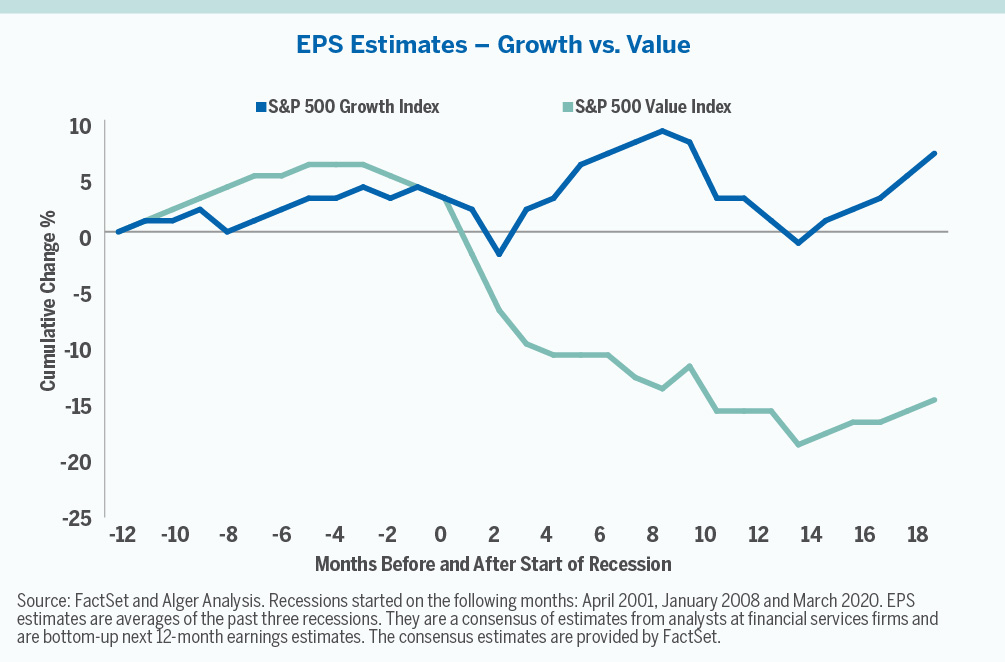What is Recession Resistant?
Many investors are contemplating a potential U.S. recession over the next year. To plan for a recession, investors may want to consider earnings sensitivity to economic activity. In other words, what is recession resistant?
Many investors are contemplating a potential U.S. recession over the next year. To plan for a recession, investors may want to consider earnings sensitivity to economic activity. In other words, what is recession resistant?

- Given that only three of the past 11 Fed tightenings have resulted in “soft landings” or the avoidance of recessions, it may be prudent to plan for a recession. But not all types of companies have similar fundamental sensitivity to the economic cycle.
- Over the past three recessions, growth stock earnings have held up much better than that of value stocks. We believe one reason is that changes in earnings are magnified relative to changes in revenue for value stocks because they have higher fixed operating costs and greater interest expense. Additionally, in our view, value stocks tend to operate in markets with more economic sensitivity, such as home building, consumer durables, capital goods, and banking, as compared to growth stocks which are propelled more by secular growth, which involves capturing market share by disrupting industries. For example, cloud computing is disrupting on-premises computing and medical advancements are constantly replacing older legacy health care products.
- While growth companies have recently borne the brunt of valuation multiple compression, history suggests that earnings reductions may hit value stocks harder.
The S&P 500 Growth Index measures the performance of growth stocks within the S&P 500 Index.
The S&P 500 Value Index measures the performance of value stocks within the S&P 500 Index.
The views expressed are the views of Fred Alger Management, LLC (“FAM”) and its affiliates as of July 2022. These views are subject to change at any time and may not represent the views of all portfolio management teams. These views should not be interpreted as a guarantee of the future performance of the markets, any security or any funds managed by FAM. These views are not meant to provide investment advice and should not be considered a recommendation to purchase or sell securities.
Risk Disclosures: Investing in the stock market involves risks, including the potential loss of principal. Growth stocks may be more volatile than other stocks as their prices tend to be higher in relation to their companies’ earnings and may be more sensitive to market, political, and economic developments. Local, regional or global events such as environmental or natural disasters, war, terrorism, pandemics, outbreaks of infectious diseases and similar public health threats, recessions, or other events could have a significant impact on investments. Foreign securities and Emerging Markets involve special risks including currency fluctuations, inefficient trading, political and economic instability, and increased volatility. Past performance is not indicative of future performance. Investors whose reference currency differs from that in which the underlying assets are invested may be subject to exchange rate movements that alter the value of their investments.
Important Information for US Investors: This material must be accompanied by the most recent fund fact sheet(s) if used in connection with the sale of mutual fund and ETF shares. Fred Alger & Company, LLC serves as distributor of the Alger mutual funds.
Important Information for UK and EU Investors: This material is directed at investment professionals and qualified investors (as defined by MiFID/FCA regulations). It is for information purposes only and has been prepared and is made available for the benefit investors. This material does not constitute an offer or solicitation to any person in any jurisdiction in which it is not authorised or permitted, or to anyone who would be an unlawful recipient, and is only intended for use by original recipients and addressees. The original recipient is solely responsible for any actions in further distributing this material and should be satisfied in doing so that there is no breach of local legislation or regulation.
Certain products may be subject to restrictions with regard to certain persons or in certain countries under national regulations applicable to such persons or countries.
Alger Management, Ltd. (company house number 8634056, domiciled at 78 Brook Street, London W1K 5EF, UK) is authorised and regulated by the Financial Conduct Authority, for the distribution of regulated financial products and services. FAM and/or Weatherbie Capital, LLC, U.S. registered investment advisors, serve as sub-portfolio manager to financial products distributed by Alger Management, Ltd.
Alger Group Holdings, LLC (parent company of FAM and Alger Management, Ltd.), FAM, and Fred Alger & Company, LLC are not authorized persons for the purposes of the Financial Services and Markets Act 2000 of the United Kingdom (“FSMA”) and this material has not been approved by an authorized person for the purposes of Section 21(2)(b) of the FSMA.
Important information for Investors in Israel: This material is provided in Israel only to investors of the type listed in the first schedule of the Securities Law, 1968 (the “Securities Law”) and the Regulation of Investment Advice, Investment Marketing and Investment Portfolio Management Law, 1995. The Fund units will not be sold to investors who are not of the type listed in the first schedule of the Securities Law.
Fred Alger & Company, LLC 100 Pearl Street, New York, NY 10004 / www.alger.com
800.305.8547 (Retail) / 800.223.3810 (Institutional)
